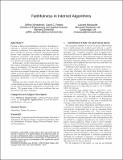| dc.contributor.author | Shneidman, Jeffrey | |
| dc.contributor.author | Parkes, David C. | |
| dc.contributor.author | Massoulie, Laurent | |
| dc.date.accessioned | 2010-05-03T17:00:36Z | |
| dc.date.issued | 2004 | |
| dc.identifier.citation | Shneidman, Jeffrey, David C. Parkes, and Laurent Massoulie. 2004. Faithfulness in internet algorithms. In Proceedings of the ACM SIGCOMM workshop on practice and theory of incentives in networked systems: September 3, 2004, Portland, Oregon, ed. D. Katabi, R. Sami, ACM Digital Library, Association for Computing Machinery, and Special Interest Group on Data Communications, 220-227. New York, N.Y.: ACM Press. http://portal.acm.org/toc.cfm?id=1016527. | en_US |
| dc.identifier.isbn | 1-58113-942-9 | en_US |
| dc.identifier.uri | http://nrs.harvard.edu/urn-3:HUL.InstRepos:4045846 | |
| dc.description.abstract | Proving or disproving faithfulness (a property describing robustness to rational manipulation in action as well as information revelation) is an appealing goal when reasoning about distributed systems containing rational participants. Recent work formalizes the notion of faithfulness and its foundation properties, and presents a general proof technique in the course of proving the ex post Nash faithfulness of a theoretical routing problem [11].In this paper, we use a less formal approach and take some first steps in faithfulness analysis for existing algorithms running on the Internet. To this end, we consider the expected faithfulness of BitTorrent, a popular file download system, and show how manual backtracing (similar to the the ideas behind program slicing [22]) can be used to find rational manipulation problems. Although this primitive technique has serious drawbacks, it can be useful in disproving faithfulness.Building provably faithful Internet protocols and their corresponding specifications can be quite difficult depending on the system knowledge assumptions and problem complexity. We present some of the open problems that are associated with these challenges. | en_US |
| dc.description.sponsorship | Engineering and Applied Sciences | en_US |
| dc.language.iso | en_US | en_US |
| dc.publisher | Association for Computing Machinery | en_US |
| dc.relation.isversionof | doi:10.1145/1016527.1016537 | en_US |
| dc.relation.hasversion | http://www.eecs.harvard.edu/econcs/pubs/pins04.pdf | en_US |
| dash.license | LAA | |
| dc.subject | backtracing | en_US |
| dc.subject | computational failure models | en_US |
| dc.subject | computational mechanism design | en_US |
| dc.subject | distributed algorithmic mechanism design | en_US |
| dc.subject | faithfulness | en_US |
| dc.subject | program slicing | en_US |
| dc.subject | rational failure | en_US |
| dc.subject | rational manipulation | en_US |
| dc.title | Faithfulness in Internet Algorithms | en_US |
| dc.type | Other | en_US |
| dc.description.version | Accepted Manuscript | en_US |
| dash.depositing.author | Parkes, David C. | |
| dc.date.available | 2010-05-03T17:00:36Z | |
| dc.identifier.doi | 10.1145/1016527.1016537 | * |
| dash.contributor.affiliated | Parkes, David | |


